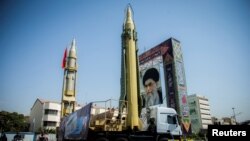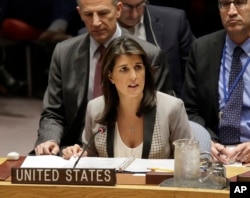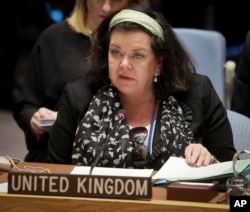Envoys from Britain, France and the United States voiced concern Tuesday at the United Nations following Iran's test-firing of a medium-range ballistic missile last Saturday.
"Iran's recent ballistic missile test was dangerous and concerning, but not surprising," U.S. Ambassador Nikki Haley said in a statement. "The United States has repeatedly warned the world about Iran's deliberate efforts to destabilize the Middle East and defy international norms."
Haley said the missile test was "provocative" and urged the international community not to keep "turning a blind eye every time Iran blatantly ignores Security Council resolutions."
On Saturday, U.S. Secretary of State Mike Pompeo accused Iran of carrying out the launch in violation of U.N. resolutions and called on Tehran to cease such activities.
A 2015 U.N. resolution endorsing the Iran nuclear deal "calls on" Tehran not to engage in missile development, but it does not expressly forbid it.
State-run news agency IRNA quoted Iranian Foreign Ministry spokesman Bahram Qasemi as saying the country's missile program is "defensive in nature" and does not violate any U.N. resolution. He did not confirm or deny carrying out the test.
Britain and France called for the closed-door discussions Tuesday in the Security Council.
"We recognize that Iran has a legitimate role in the region and we recognize that she has legitimate defensive needs," British U.N. Ambassador Karen Pierce told reporters. "But we also believe, and our information is, that the sorts of missiles she test-launched on 1 December go way beyond legitimate defensive needs and, in respect of her overall role in region, we look again to Iran to cease her destabilizing activity and play a constructive role in this very important region."
France's U.N. envoy said there was "widely-shared concern" among the 15 council members related to the launch. Francois Delattre said the test firing was "inconsistent" with U.N. resolutions, but he did not go so far as to say it was a violation.
Israel, Hezbollah
Meanwhile, Israel began a military operation against tunnels it says were built by the Iranian-backed Lebanese group Hezbollah in southern Lebanon. There was no immediate reaction from Hezbollah.
Operation Northern Shield is taking place on the Israeli side of the joint border.
"Israel has no interest in escalation, but we will do whatever it takes to defend our sovereignty and our citizens," Israel's U.N. envoy Danny Danon told reporters.
He said Tehran's ballistic missile tests and Hezbollah's tunnels are all connected.
"When you see tunnels in Lebanon, it's connected to ballistic missile tests. It's all coming from Iran. Iran is funding all of those terrorist activities," Danon said.
"This is another example of Iran's revolutionary foreign policy that is expansionist and destabilizing for the Middle East, when Iranian-backed Hezbollah is digging tunnels into another country beneath their borders," said U.S. Special Representative for Iran Brian Hook. "So we condemn this activity and support Israel in its military operations to address these tunnels."






